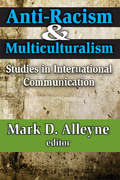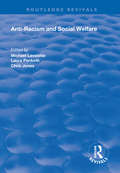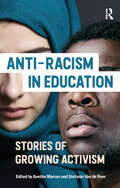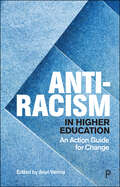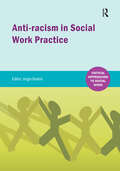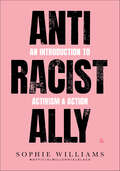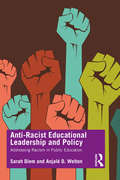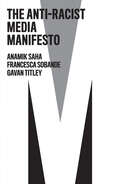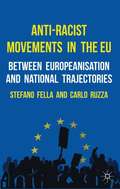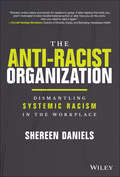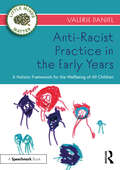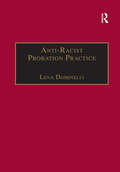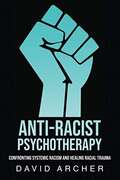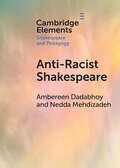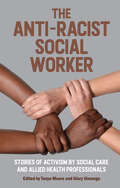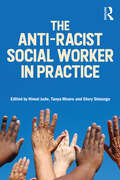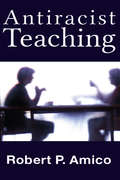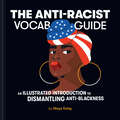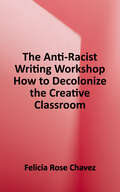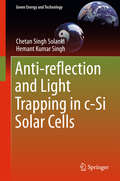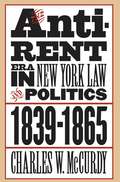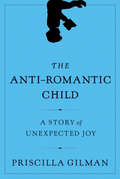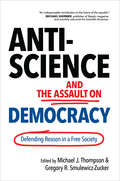- Table View
- List View
Anti-racism and Multiculturalism: Studies in International Communication (Studies In International Communication Ser.)
by Mark D. AlleyneAll scholarly books are engagements with the existing literature, often the published scholarly work of one established discipline. This book originated with modest objectives, to produce a work that would be in conversation with the literature of international relations even though not of relevance only to that field. The professed goal of international relations is international peace. The ethical lens of pondering the best means to achieve world peace is used to filter media content in the field of multiculturalism and anti-racism. Although there has been little work on the impact of racial difference on the contours of contemporary international order, there has been a sizeable body of research intended to abolish the credibility of pseudo-scientific racism. Such racism has provided the ideological foundation and justification for imperialism, colonialism, the holocaust, and apartheid. Race has been debunked as a myth. Because of this, racism - the ideology bred of human classification according to racial difference - has been found to be intellectually and morally barren. But the need to communicate egalitarian and scientific sentiments remains. The contributors to this volume consider five questions: How does the literature on antiracism improve our understanding of conflict resolution? How does the analysis of the media's role in racist and anti-racist discourses improve the process of theorizing on hate and war propaganda? How can research on anti-racist discourse improve UN peacekeeping? What implications does this subject have for theory-building and cultural diversity? How and why should the literature on anti-racism expand research in international relations? This is a unique, worthwhile framework for cross-disciplinary research in race and intellectual consensus and conflict.
Anti-racism and Social Welfare (Routledge Revivals)
by Michael Lavalette Laura Penketh Chris JonesFirst published in 1998 , this book is a compendium of writings in regards to racism in 1990s Britain and the social impact racism have on black communities in Britain in regards to unemployment , working conditions , housing and health. Aiming to create a mode to provide a platform for a discourse on British black experience; by assessing the success and failures of various ant-racist strategies within welfare institutions and services designed to assist.
Anti-racism in Education: Stories of Growing Activism
by Geetha Marcus Stefanie Van de PeerA powerful book comprising stories of anti-racist action by higher education scholars including researchers and teachers at various stages of their careers. Aimed at and relevant for anyone in education, it encourages reflection on the tolerance of racist structures and strategies to help enact positive change.An edited volume, each chapter discusses the author's experiences of racism, including how they became part of anti-racist teaching activism through a growing understanding of the impact of racism in education. Common themes are highlighted throughout so readers can engage with relevant ideas and issues to draw inspiration for their own anti-racist action.The book draws attention to the idea that while discussion is welcome, it should be a pre-cursor to focused action. It shows exactly how university lecturers, teachers and anyone involved in education can contribute in a meaningful way to the change that is needed. To promote critical thinking, each chapter includes challenging questions and suggested additional readings/resources.
Anti-Racism in Higher Education: An Action Guide for Change
by Arun VermaHow is your institution enabling Black, Asian and minority ethnic staff and students to thrive? Is your institution effectively tackling racism? Following the 2020 Black Lives Matter movement, the higher education sector has started making bold commitments to dismantling structural racism. However, big questions remain about how higher education can combat institutional racism and achieve real change. This book disrupts the higher education sector through ambitious actions and collective, participatory and evidence-informed responses to racism. It offers a roadmap for senior leaders, staff and students to build strategies, programmes and interventions that effectively tackle racism. Arising from current staff and recent student experiences, this book supports institutions driving equality, diversity, inclusion and intersectional programmes in higher education.
Anti-racism in Social Work practice (Critical Approaches to Social Work)
by Angie BartoliAnti-racism has a long history within the profession of social work and its education. Despite an agenda within higher education which promotes internationalization and practice which recognizes diversity, little has been written to address the question of why black African students have a different experience from others on their social work educational journey.This book is based upon the authors’ experience as educators and their own research about and with black students’ experience of racism and ‘otherness’ within social work practice and education. Radical and honest in nature, it re-visits anti-racism within social work practice and education from a student focused and informed perspective based on lived experience and conversations.This book will be of interest to all social work students, educators and policy makers with an interest in anti-racism and diversity. It includes practical models and tried and tested tools to help the reader work through these issues. Tools that can assist students in discussing uncomfortable issues in the classroom are to be welcomed, and this book is thus a valuable resource. This book offers many examples of how racism can be addressed in social work education and training. Important features of the book are the summaries of key pieces of research in each chapter, as well as, case studies and critical questions, which provide a springboard for discussion. It offers a timely reminder that discussion about race and anti-racist forms of pedagogical approaches for teaching has fallen off the agenda. It is written in an accessible style, is an engaging read, and this is a welcome addition to the literature.Dr Claudia Bernard, Goldsmiths College.
Anti-Racist Ally: An Introduction to Activism & Action
by Sophie WilliamsJoin the fight for racially marginalized people with this pocket-sized guide filled with practical insights from one of the leading voices of the movement for equality and founder of the @officialmillennialblack Instagram.As the tragic murder of George Floyd and the Black Lives Matter movement has demonstrated, not being racist is not enough. To fulfill the American ideal, to ensure that all people are equal, you must be actively anti-racist. In this essential guide, Sophie Williams, goes beyond her popular Instagram @officialmillennialblack, providing sharp, simple, and insightful steps anyone can take to be a better ally in the fight against racism. While the book’s focus is on race, it also touches on sexism, classism, ableism, oppression, and white supremacy. Written in her iconic Instagram style, this pocket-sized guide is a crucial starting point for every anti-racist ally, covering complex topics at the heart of anti-racist principles. Whether you are just finding your voice, have made a start but aren’t sure what to do next, or want a fresh viewpoint, Anti-Racist Ally introduces and explains the language of change and shows you how to challenge the system, beginning with yourself. Sophie reminds you that this is a learning process, which means facing difficult truths, becoming uncomfortable, and working through the embarrassment and discomfort. The fight for justice isn’t easy there aren’t any shortcuts or quick wins. But together, anti-racist allies can use their power to truly change the world and lives.
Anti-Racist Educational Leadership and Policy: Addressing Racism in Public Education
by Sarah Diem Anjalé D. WeltonAnti-Racist Educational Leadership and Policy helps educational leaders better comprehend the racial implications and challenges of the current educational policy landscape. Each chapter unpacks a policy issue such as school choice, school closures, standardized testing, discipline, and school funding, and analyzes it through the racialized and market-driven lenses of the current leadership context. Full of real examples, this book equips aspiring school leaders with the skills to question how a policy addresses or fails to address racism, action-oriented strategies to develop anti-racist solutions, and the tools to encourage their school community to promote racial equity. This important book demystifies a complex policy context and prepares current and future teacher leaders, principals, and superintendents to lead their schools towards more equitable practice.
The Anti-Racist Media Manifesto (The Manifesto Series)
by Anamik Saha Francesca Sobande Gavan TitleyHow can we make media anti-racist? The rise of the far right, the impacts of Covid-19, and the mediated evidence of racist police violence have challenged the dominant complacency that racism was a thing of the past. We are now witnessing the renewed anti-racist commitment of social movements and the rising authoritarianism that seeks to suppress it. Rather than making media ‘less racist’, how can media systems be transformed in ways that actively challenge the production of racism? What should an anti-racist media look like? Saha, Sobande and Titley address these timely questions to outline the essential steps for working towards an anti-racist media future. Revealing how the media are implicated in racism, the authors consider how systems, policies and practices can be transformed to confront and prevent it. Focusing on the problems of impartiality, the limits of diversity and representation, and the contradictions of digital culture, this manifesto illuminates key strategies and suggestions to move us closer to an anti-racist media future for everyone.
Anti-Racist Movements in the EU
by Stefano Fella Carlo RuzzaSuccessive EU treaties may have instituted a common framework for fighting racial discrimination and intolerance across Europe, but it is a framework that masks the significant differences that arise as a result of national context: for example, pre-existing national anti-racist policies and legislation; the degree of success, character and development of anti-racist movements as well as the political, socio-economic and cultural context in which these policies and movements arise. The aim of this book is to provide an understanding of these different national contexts by exploring the nature of anti-racist movements in six different EU member states and their relationship to political institutions and policy-making, while also reflecting on the impact of the new European sphere of decision-making. Drawing on extensive primary research involving interviews with movement and policy actors at the national and EU level, the book sheds light on the nature of racism and responses to it across Europe, analysing the impact of Europeanisation of policy-making on the sector, and exploring north-south and east-west differences and patterns of convergence.
The Anti-Racist Organization: Dismantling Systemic Racism in the Workplace
by Shereen DanielsTackle systemic racism in the workplace with practical strategies In The Anti-Racist Organization: Dismantling Systemic Racism in the Workplace, HR strategist Shereen Daniels delivers an incisive and honest discussion of how business leaders can change workplace practices to create a more anti-racist and equitable environment. The author draws on her personal and client-facing experience, historical fact, legal proceedings, HR insights, and quantitative analysis to equip readers with the knowledge and tools they need to transform their companies. Daniels also looks at: The role of executive leaders and how to push past discomfort to credibly and authentically lead change Strategies for recognising the problem of systemic racism and implementing impactful solutions Why it’s important to empower colleagues to be pioneers of change and how to do that Explanations of why diversity and inclusion initiatives haven’t yet solved the problem Ways language can either be a weapon to perpetuate systemic racism or a tool to dismantle An indispensable exploration of how systemic racism is engrained into business structures, policies, and procedures, The Anti-Racist Organization: Dismantling Systemic Racism in the Workplace belongs in the libraries of all business leaders seeking to make their workplace more inclusive and equitable.
Anti-Racist Practice in the Early Years: A Holistic Framework for the Wellbeing of All Children (Little Minds Matter)
by Valerie DanielAre all children treated equally in your class? Are you aware if you are displaying unconscious bias? How might this be playing out in your setting? These conversations need to take place if we are ever to shift systemic racism, for the wellbeing of all children in the early years and beyond. This essential guide addresses diversity and inclusion in a meaningful and constructive way. The holistic approach explores a range of pertinent topics for the early years and demonstrates the positive impact educators can make by developing their knowledge of systemic racism, critically reflecting upon their provision, and embedding anti-racist practice within their settings. This book includes: A framework to embed and sustain anti-racist practice in early years education. Case studies to explore constructions of racism in early childhood and the experiences of black children and their families. Reflective questions to encourage readers to consider their own practices and to drive change. A brief history of racism to create a sense of understanding and awareness of how we got to where we are today. Practical strategies to equip those who work in the early years and to gain confidence in their anti-racist practice. A focus on the power of professional love and co-creation to shift the dynamic and build the best outcomes for all children. By making anti-racism real in our learning environments and reflecting upon and reviewing provision, early years educators can ensure they are committed to their remit of advocacy for the children and communities whose lives they touch. This powerful book is a vital read for all trainee and practising early years professionals, reception teachers, nursery teachers, and managers.
Anti-Racist Probation Practice
by Lena DominelliThe probation service has committed itself to anti-racist initiatives and those promoting equal opportunities for some time. However, the experiences of black people, whether as workers or 'clients' indicates that the realities of day-to-day practice are far removed from this. Moreover, the picture is just as bleak if not even more so in other parts of the criminal justice system including the judiciary and the prison service. Anti-Racist Probation Practice addresses this conundrum and drawing on the experiences of black people makes practical proposals for moving forward in non-tokenistic ways. These include core areas of practice, for example court reports monitoring systems; resource allocation; and working relations. Arguing that process, procedures and outcomes in the work done must be taken together if individual, institutional and cultural racism are to be eradicated, the book shows that anti-racist probation practice must be taken seriously by both black and white people if it is to materialise.
Anti-Racist Psychotherapy: Confronting Systemic Racism and Healing Racial Trauma
by David ArcherThis book may be the first to discuss anti-racism from a scientific and family-systems based approach. It also explores the neurobiological implications of racial trauma. The purpose of anti-racist psychotherapy is to explain the societal function of anti-Black racism and to equip the reader with strategies to reprocess the mental health consequences of it. With this book, the reader will acquire a knowledgebase for becoming more authentic, more aware, and more committed to social change. Raising our racial consciousness allows people of all cultural backgrounds to be more fully equipped to stop the trauma of racism.
Anti-Racist Shakespeare (Elements in Shakespeare and Pedagogy)
by Ambereen Dadabhoy Nedda MehdizadehAnti-Racist Shakespeare argues that Shakespeare is a productive site to cultivate an anti-racist pedagogy. Our study outlines the necessary theoretical foundations for educators to develop a critical understanding of the longue durée of racial formation so that they can implement anti-racist pedagogical strategies and interventions in their classrooms. This Element advances teaching Shakespeare through race and anti-racism in order to expose students to the unequal structures of power and domination that are systemically reproduced within society, culture, academic disciplines, and classrooms. We contend that this approach to teaching Shakespeare and race empowers students not only to see these paradigms but also to take action by challenging and overturning them. This title is also available as Open Access on Cambridge Core.
The Anti-Racist Social Worker: stories of activism by social care and allied health professionals
by Tanya Moore Glory SimangoThis is the story of an anti-racist campaign staged by social workers and allied health professionals which encourages readers to consider their own possibilities for anti-racist action.The murder of George Floyd in May 2020 and subsequent expression of anger, frustration and grief at the continued existence of racism led to more sophisticated and honest conversations about racism and its impact. Social work also started to recognise its own problem with racist systems and its failure as a profession that strives for social justice to have addressed this in any meaningful way.The Anti-Racist Social Worker describe a successful campaign of anti-racist direct action that was staged by a small group of social workers and occupational therapists. The opening chapter tells the story of the campaign from the coming together of the campaign group to the concluding day of action. Subsequent chapters are written by campaign members at different stages of their career, from student social worker to Chief Social Worker for England. Each describes journeys to and stories of anti-racist activism. These stories are about either the writers’ experiences of racism and how this translated into action or their growing understanding of the impact of racism and subsequent decision to take personal action. Importantly, each chapter offers a personal case study and therefore a suggestion of individual anti-racist action that can be taken by social workers.The Anti-Racist Social Worker is a call for action told through individual stories. It shows how those in social care and allied health professions can contribute in a meaningful way to the creation of the change we need and encourages everyone to consider their own roles in dismantling racism.
The Anti-Racist Social Worker in Practice
by Nimal Jude Tanya Moore Glory SimangoThe Anti-Racist Social Worker in Practice shows how anti-racism can be woven into daily practice. With examples from both children’s and adult’s services, it empowerssocial workers to find their own path to challenge racism through their work with people, families and communities.Despite the rich body of literature discussing the need for anti-racist approaches to social work, many practitioners still lack confidence in their own ability to find the words and actions needed to address experiences of marginalisation.This book is a collection of experiences and stories of anti-racist practice, written by social workers and people with lived experience. Each chapter takes an element of practice and considers it through an anti-racist lens. The book equips readers with practically applicable approaches to inform and develop their own anti-racist practice.
Anti-Racist Teaching
by Robert P. Amico<P>"Antiracist Teaching" is about awakening students to their own humanity. In order to teach about this awakening one must be in the process of awakening oneself. The author shares personal anecdotes to illustrate the kinds of changes he experienced as a result of his antiracist teaching. His book explores the questions, <br>Why is teaching about racism and white privilege to white students so difficult? <br>and What can educators do to become more effective antiracist teachers for all of their students? <P>Amico examines the cognitive and emotive obstacles that students experience in the classroom and argues that understanding these difficulties can lead to their resolution. He considers a variety of different approaches to antiracist teaching and endorses a dialogic approach. <P>Dialogue is the centerpiece of students classroom experiences; students engage in dialogue at nearly every class meeting. The dialogic approach is effective in a variety of different learning settings from K 12 classrooms, trainings, retreats, workshops, and community organizations to the college classroom. Further, the book discusses how to bring antiracist teaching into the core of university curricula.
Anti-Racist Vocab Guide: An Illustrated Introduction to Dismantling Anti-Blackness
by Maya EaleyFrom "Assimilation" to "Decolonization," "Black Wall Street" to "Police Brutality," and "Colorism" to "White Supremacy," this book equips you with the language to engage in crucial conversations around anti-Black racism.The Anti-Racist Vocab Guide is a boldly illustrated visual glossary that distills complex subjects into comprehensive yet accessible definitions of terms and provides concise and insightful explanations of historical moments. With reflection questions to use for introspection or as a starting point for hard conversations with those close to you, this book will encourage both your learning and unlearning—no matter where you are in your journey to understanding race in America.THOROUGH AND APPROACHABLE: This book presents huge topics in easy-to-understand language that welcomes readers of every experience.REFLECTION QUESTIONS: Each entry is followed by questions to encourage readers to continue their education and translate their new understanding into positive action in their daily lives.BEYOND THE BUZZWORDS: This is an invaluable resource guide that breaks down and goes beyond common phrases to provide actionable awareness.EVOCATIVE ART: Author Maya Ealey's striking art provides conceptual illustrations of each term explained in the book in her bold, passionate style.Perfect for:Anyone interested in learning more about race in AmericaPeople who want help understanding the complicated subject of racismParents, teachers, and studentsReaders of instructive and informative best sellers such as How to Be an Antiracist, White Fragility, The 1619 Project, and Do the Work!: An Antiracist Activity Book
The Anti-Racist Writing Workshop: How to Decolonize the Creative Classroom
by Felicia Rose ChavezThis easy-to-use guide explains how to recruit, nourish, and fortify writers of color through innovative reading, writing, workshop, critique, and assessment strategies. A captivating mix of memoir and progressive teaching strategies, The Anti-Racist Writing Workshop: How to Decolonize the Creative Classroom demonstrates how to be culturally attuned, twenty-first-century educators. The Anti-Racist Writing Workshop is a call to create healthy, sustainable, and empowering classroom communities. Award-winning educator Felicia Rose Chavez exposes the invisible politics of power and privilege that have silenced writers of color for far too long. It’s more urgent than ever that we consciously work against traditions of dominance in the classroom, but what specific actions can we take to achieve authentically inclusive communities? Together, we will address how to: - Deconstruct our biases to achieve a cultural shift in perspective. - Design a democratic teaching model to create safe spaces for creative concentration. - Recruit, nourish, and fortify students of color to best empower them to exercise voice. - Embolden our students to self-advocate as responsible citizens in a globalized community. Finally, a teaching model that protects and platforms students of color, because every writer deserves access to a public voice. For anyone looking to liberate their thinking from “the way it’s always been done,” The Anti-Racist Writing Workshop is a clear, compelling guidebook on a necessary step forward.
Anti-reflection and Light Trapping in c-Si Solar Cells (Green Energy and Technology)
by Hemant Kumar Singh Chetan Singh SolankiThis book offers essential insights into c-Si based solar cells and fundamentals of reflection, refraction, and light trapping. The basic physics and technology for light trapping in c-Si based solar cells are covered, from traditional to advanced light trapping structures. Further, the book discusses the latest developments in plasmonics for c-Si solar cell applications, along with their future scope and the requirements for further research. The book offers a valuable guide for graduate students, researchers and professionals interested in the latest trends in solar cell technologies.
Anti-Refugee Violence and African Politics
by Ato Kwamena OnomaUsing comparative cases from Guinea, Uganda, and the Democratic Republic of Congo, this study explains why some refugee-hosting communities launch large-scale attacks on civilian refugees whereas others refrain from such attacks even when encouraged to do so by state officials. Ato Kwamena Onoma argues that such outbreaks only happen when states instigate them because of links between a few refugees and opposition groups. Locals embrace these attacks when refugees are settled in areas that privilege residence over indigeneity in the distribution of rights, ensuring that they live autonomously of local elites. The resulting opacity of their lives leads locals to buy into their demonization by the state. Locals do not buy into state denunciation of refugees in areas that privilege indigeneity over residence in the distribution of rights because refugees in such areas are subjugated to locals who come to know them very well. Onoma reorients the study of refugees back to a focus on the disempowered civilian refugees that constitute the majority of refugees even in cases of severe refugee militarization.
The Anti-Rent Era in New York Law and Politics, 1839-1865
by Charles W. MccurdyA compelling blend of legal and political history, this book chronicles the largest tenant rebellion in U.S. history. From its beginning in the rural villages of eastern New York in 1839 until its collapse in 1865, the Anti-Rent movement impelled the state's governors, legislators, judges, and journalists, as well as delegates to New York's bellwether constitutional convention of 1846, to wrestle with two difficult problems of social policy. One was how to put down violent tenant resistance to the enforcement of landlord property and contract rights. The second was how to abolish the archaic form of land tenure at the root of the rent strike.Charles McCurdy considers the public debate on these questions from a fresh perspective. Instead of treating law and politics as dependent variables--as mirrors of social interests or accelerators of social change--he highlights the manifold ways in which law and politics shaped both the pattern of Anti-Rent violence and the drive for land reform. In the process, he provides a major reinterpretation of the ideas and institutions that diminished the promise of American democracy in the supposed "golden age" of American law and politics.
The Anti-Romantic Child: A Story of Unexpected Joy
by Priscilla Gilman“A beautifully sinuous and intensely literary celebration of the exceptional, unconventional child.” —Publishers Weekly, starred reviewPriscilla Gilman, a teacher of romantic poetry who embraced Wordsworth’s vision of childhood’s spontaneous wonder, eagerly anticipated the birth of her first child, certain that he would come trailing clouds of glory. But as Benjamin grew, his remarkable precocity was associated with a developmental disorder that would dramatically alter the course of Priscilla’s dreams.In The Anti-Romantic Child, a memoir full of lyricism and light, Gilman explores our hopes and expectations for our children, our families, and ourselves—and the ways in which experience may lead us to re-imagine them. Using literature as a touchstone, Gilman reveals her journey through crisis to joy, illuminating the flourishing of life that occurs when we embrace the unexpected. The Anti-Romantic Child is a profoundly moving and compellingly universal book about family, parenthood, and love.“Haunting and lyrical.” —Marie Brenner, author of Apples and Oranges“Rapturously beautiful and deeply moving, profound and marvelous” —Andrew Solomon, author of The Noonday Demon and Far From the Tree“A lovely, thoughtful memoir.” —The Boston Globe“A striking celebration of the bond between a mother and son.” —Kirkus Reviews“Gilman is at once lyrical and deeply analytical as she explores the complexities of parenthood and the need to embrace the unforeseen.” —Booklist, starred review“A book every parent should read.” —Kathryn Erskine, National Book award–winning author of Mockingbird “A very moving personal story.” —Tina Brown, Newsweek“Smart, soulful, and involving.” —Nick Hornby, The Believer
Anti-SARS-CoV-2 Activity of Flavonoids
by Jen-Tsung ChenIn the past years, COVID-19 caused millions of deaths and severely damaged not only public health, but also the global economy. New variants continue to threaten human health. Thus, natural compounds for retarding infection are in high demand. This book summarizes the emerging research with flavonoids, whose application holds great promise of antivirus, anti-inflammation, antioxidative stress, and immunomodulatory. Topics include the role of flavonoids in preventing an inflammatory storm and how flavonoids interact with critical protein targets that are involved in the infection stages of COVID-19.Key Features• Highlights anti-SARS-CoV-2 drug discovery on natural products and medicinal plants• Includes all major subclasses of flavonoids that promisingly combat COVID-19 • Proposes molecular mechanisms of flavonoids against protein targets of SARS-CoV-2• Contributions from an international team of leading researchers• Provides recommendations with respect to the future research
Anti-Science and the Assault on Democracy: Defending Reason in a Free Society
by Michael J. Thompson Gregory R. Smulewicz-ZuckerDefending the role that science must play in democratic society--science defined not just in terms of technology but as a way of approaching problems and viewing the world.In this collection of original essays, experts in political science, the hard sciences, philosophy, history, and other disciplines examine contemporary anti-science trends, and make a strong case that respect for science is essential for a healthy democracy. The editors note that a contradiction lies at the heart of modern society. On the one hand, we inhabit a world increasingly dominated by science and technology. On the other, opposition to science is prevalent in many forms--from arguments against the teaching of evolution and the denial of climate change to the promotion of alternative medicine and outlandish claims about the effects of vaccinations. Adding to this grass-roots hostility toward science are academics espousing postmodern relativism, which equates the methods of science with regimes of "power-knowledge." While these cultural trends are sometimes marketed in the name of "democratic pluralism," the contributors contend that such views are actually destructive of a broader culture appropriate for a democratic society. This is especially true when facts are degraded as "fake news" and scientists are dismissed as elitists. Rather than enhancing the capacity for rational debate and critical discourse, the authors view such anti-science stances on either the right or the left as a return to premodern forms of subservience to authority and an unwillingness to submit beliefs to rational scrutiny. Beyond critiquing attitudes hostile to science, the essays in this collection put forward a positive vision for how we might better articulate the relation between science and democracy and the benefits that accrue from cultivating this relationship.
